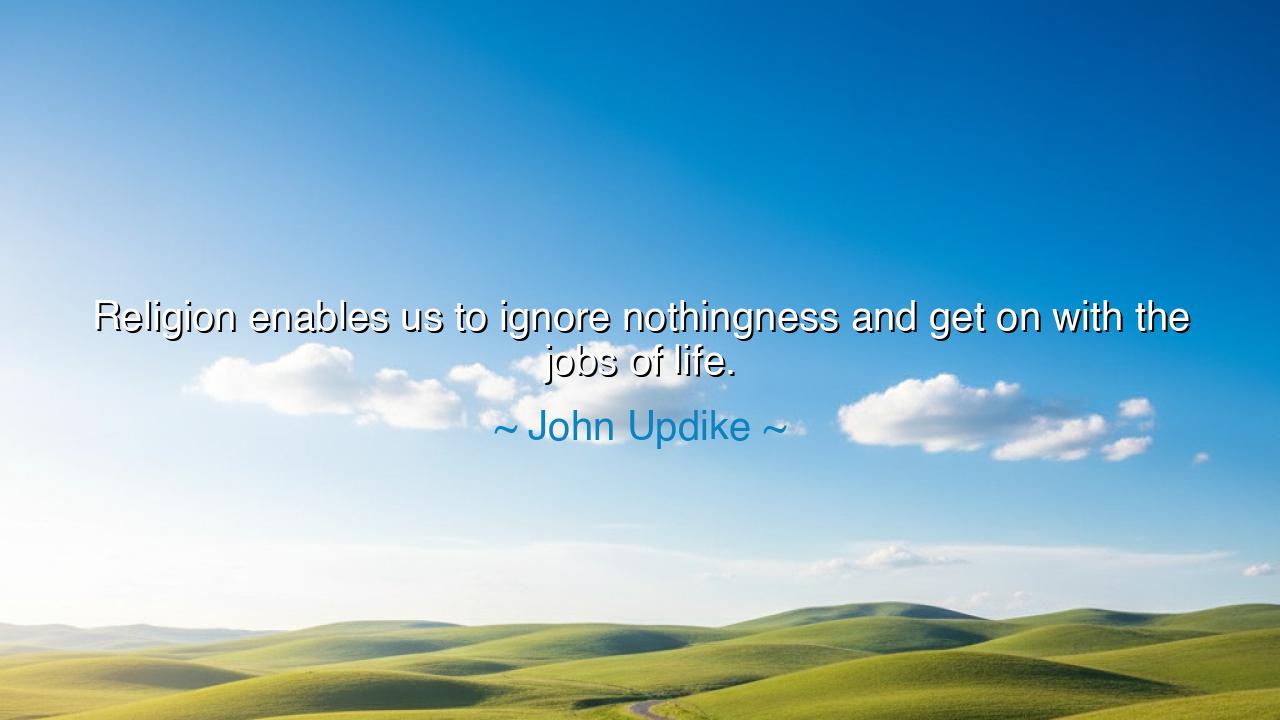
Religion enables us to ignore nothingness and get on with the






Hear, O seeker of meaning, the words of John Updike, a poet of the ordinary and a witness to the quiet struggles of the human soul: “Religion enables us to ignore nothingness and get on with the jobs of life.” These words speak not from the throne of a preacher but from the heart of one who grappled with doubt, mortality, and the small duties of existence. In them lies the acknowledgment of life’s most haunting truth—that we are fleeting, that the abyss of nothingness surrounds us—and yet, through faith, humanity finds the courage to work, to love, to build, and to endure.
Consider the weight of nothingness. To the mind that gazes too long into the void, life may seem fragile, meaningless, destined only for decay. What is the point of sowing fields that will one day wither, of raising children who will one day die, of striving for beauty when time erases all? Without some answer, despair can creep into the soul like a thief in the night. Updike, in his honesty, admits that religion does not erase this abyss but teaches us how to turn from it without being destroyed by it.
For religion, in all its varied forms, provides narratives, rituals, and promises that give shape to the chaos of existence. It whispers of eternity where there is decay, of purpose where there is futility, of divine love where there is loneliness. In this way, it gives the soul the strength to “get on with the jobs of life”—to rise from bed, to labor with one’s hands, to love one’s family, to serve one’s community. Religion is not only a ladder to heaven but also a bridge across despair, enabling the ordinary tasks of survival and meaning to continue.
History bears witness to this truth. In the Black Death of the fourteenth century, as plague swept through Europe, millions turned to faith not merely for salvation in the next world, but for the strength to endure the present. Priests, monks, and ordinary believers buried the dead, cared for the sick, and comforted the grieving, sustained by the conviction that life had value beyond the grave. Without such faith, many would have collapsed into despair, paralyzed by the enormity of death. Religion gave them courage to continue with the duties of life in the face of overwhelming nothingness.
Yet Updike’s words are not only for the faithful of old but for modern hearts as well. In an age where many have cast aside belief, the shadow of nothingness often returns in new forms—existential dread, anxiety, the feeling of futility in endless labor. Even here, the remnants of religious thought—ritual, community, the search for transcendence—continue to help people endure. Whether through prayer, meditation, or the shared singing of sacred hymns, religion trains the heart to lift its eyes from the abyss and place its hands upon the work of life.
The meaning, then, is not that religion solves the riddle of existence, but that it equips us to live within it. To ignore nothingness is not to deny its reality, but to keep it from ruling us. Faith offers the strength to say: Yes, death is certain, but life is still worth living. Yes, the void exists, but love, duty, and creation are stronger than despair. With such a vision, the smallest acts—baking bread, tilling soil, raising children—become sacred defiance against the void.
The lesson for us is clear: find a faith, a ritual, a practice that gives you strength to endure the silence of nothingness. If you are religious, let your creed not only prepare you for eternity but empower you to labor in the present. If you are not, seek the wisdom of tradition, the discipline of community, and the reverence for life that faith has cultivated for centuries. Do not let despair paralyze you. Instead, let belief—whether in God, in love, or in the dignity of human endeavor—be the lamp that lights your way.
Therefore, O child of dust and eternity, remember John Updike’s wisdom: religion enables us to ignore nothingness and get on with the jobs of life. Do not dwell endlessly upon the abyss, for it will only consume you. Instead, rise, work, love, and serve, for these are acts of courage against the void. In living fully, you declare that life is worth more than nothingness—and in this declaration, you touch the eternal.






AAdministratorAdministrator
Welcome, honored guests. Please leave a comment, we will respond soon